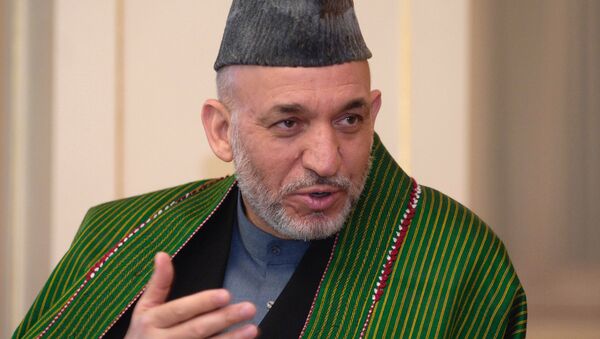MOSCOW, November 16 (Sputnik) — The United States have contributed to the expansion of extremism in Afghanistan, the country's former President Hamid Karzai said in an interview with the Radio Free Europe/Radio Liberty Sunday.
During the US presence in Afghanistan "not only extremism has not been rooted out, but it has even expanded in the region," RFE/RL quoted Karzai as saying.
"On the one hand, some U.S. leaders would come and tell us that Al-Qaeda and terrorism are located and nurtured in Pakistan and that they come to attack us from there," Karzai said.
"On the other hand, whenever we protested against Pakistan's support for terrorism they asked us not to do so and whenever we asked them to take action, they made it clear to us that they couldn't because of various problems. Once, they came to us asking for improved and constructive relationship with Pakistan, to which we would said, 'Yes, of course, the Afghan nation wants to have good and brotherly relationship with Pakistan as we are neighbors and brothers, but without compromising Afghanistan's independence and peace'," Karzai continued.
Karzai noted that the United States was "both encouraging the thief to steal and the house owner to safeguard his house", pursuing a dual policy promoting only its own interests.
Afghanistan is still in a state of turmoil, as the Afghan government has long been fighting the Taliban, an Islamic movement that spread throughout Afghanistan and formed a government that was overthrown in 2001 after the US invasion into the country.
Hamid Karzai became a major political figure in the country after the end of the Taliban regime in 2001. He served as President of Afghanistan from 2004 to 2014. In the late years of his presidency he has repeatedly expressed his reluctance to let the United States keep a residual force on the ground in Afghanistan after its 2014 pullout.
On September 30, Afghanistan, the United States and NATO signed a deal to formally justify the presence of a limited military contingent in the Central Asian state after the formal withdrawal of international forces. A follow-up force of about 12,000 troops is likely to stay throughout 2015 on training and support duties. Currently about 41,000 NATO troops remain in Afghanistan fighting the Taliban insurgency alongside Afghan soldiers and police, with the term of NATO's combat mission ending in December.




